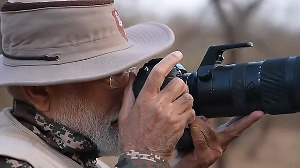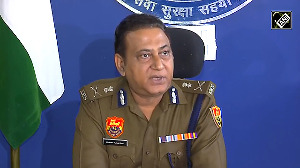Reversing the burden of evidence means that the principle of innocent until proven guilty does not apply.
It is exactly the opposite: Guilty as charged, until you can convince the judges of the contrary, points out Shekhar Gupta.

Here's a proposition for debate: Over the past 15 years or so, our judiciary, from the trial court level up to the Supreme Court has progressed -- if you call it progress -- from a reformative institution to a retributive one.
We aren't just basing this on the fact that 2022 was when India's trial courts awarded 165 death sentences, the most in a single year since 2000.
That it took the number of convicts on death row to 539. This is the highest in 17 years.
Now, we know that most of these will be commuted and some acquitted.
All of eight convicts have been hanged in India since 2000.
Four of these for the 'Nirbhaya' gang rape and murder.
Why, then, have our trial courts been so happy to pull the judicial trigger?
Let's jump now from the trial courts across the country to the top court.
Read this rising wave of angry death sentences with its latest order, sort of reinserting what it had read down in 2011, in the already draconian Unlawful Activities (Prevention) Act (UAPA).
The three-judge Bench of Justices M R Shah, C T Ravikumar and Sanjay Karol overruled the three earlier Supreme Court judgments that strengthened the principle that mere membership of a banned organisation was not an offence under UAPA.
That to be charged under the law, the alleged member should also be someone who has overtly participated in an activity organised by the banned organisation.
The latest judgment has fully read this down and effectively empowered the police or probe agencies to pick up anyone on mere suspicion of association with a banned organisation.
And once an individual is arrested on this mere suspicion of membership, he/she will be hit by the full force of the UAPA, a law so tough, it reverses the burden of proof onto the accused and makes bail nearly impossible.
This is guilt by mere suspicion of association.
Reversing the burden of evidence means that the principle of innocent until proven guilty does not apply.
It is exactly the opposite: Guilty as charged, until you can convince the judges of the contrary.
The regrettable fact is, this isn't an isolated case. Over the past several years, we have seen the top court lean in the same direction.
Several laws, especially some of the tougher laws in the larger UAPA category, have been further strengthened instead of being made fairer to the defendant, as may have been the expectation.
Or, at least, the liberal expectation, because the top court takes pride in standing up for the liberal principle, the North Star as the current Chief Justice quite rightly describes it.
How does this principled view square with not just the latest UAPA judgment, but also what the same court, under various eminent judges, has done to make the Foreign Contribution (Regulation) Act (FCRA) and the Prevention of Money Laundering Act (PMLA) even more draconian in the hands of the State.
The Delhi high court struck a blow for liberty on UAPA.
While granting bail to Devangana Kalita, Natasha Narwal and Asif Iqbal Tanha in Delhi anti-Citizenship Amendment Act protests, Justices Siddharth Mridul and Anup J Bhambhani had ruled that UAPA could only be invoked for what can be sharply defined as a terror act.
The Bench cautioned against the cavalier use of the phrase 'terrorist act', saying that the definition was wide and vague.
The Delhi police rushed to the Supreme Court, which mercifully didn't interfere with the bail but stayed the operation of the judgment.
The implication is the judgment cannot be cited as a precedent in other similar cases.
In July 2022, a two-judge Bench led by Justice A M Khanwilkar set a new judicial principle by fining a petitioner seeking a Central Bureau of Investigation probe into a massacre of tribals in Dantewada, which he alleged was a case of extra-judicial killings.
The court accepted the police version that the killings were carried out by Naxals.
It not only fined the petitioner, Himanshu Kumar, but also accepted the Centre's demand to let its agencies investigate the petitioners instead.
It added that 'the investigation may not be limited to charge of creating false evidence but may also invoke charges of criminal conspiracy or any other offence under the Indian Penal Code.'
We can go further back still. In 2016, a Bench headed by Justice Ranjan Gogoi (not CJI yet) gave another remarkable order that erased the distinction between public sector banks and private banks, in at least one critical manner.
Along with Justice P C Pant, Justice Gogoi expanded the definition of public servants under the Prevention of Corruption Act.
It held that all officials of a private bank operating under the Reserve Bank of India's licence would be treated as government servants.
Accordingly, they expanded the state and the CBI's jurisdiction to what were until then purely private businesses.
Every now and then, like the Delhi high court orders in the UAPA bail case, you find a whiff of fresh air from a court.
Like the judgment by the bench of Justices Pankaj Bhandari and Sameer Jain of the Rajasthan high court. They freed four convicts on death row in the case of the Jaipur serial bombings that killed 71 and injured many more in May 2008.
The four had already spent 15 years on death row.
All were picked up following the Batla House encounter in Delhi and suspected to be members of another module of the 'Indian Mujahideen', which claimed the Jaipur bombings.
'This is a classic example of institutional failure resulting in botched/flawed/shoddy investigation,' the judges said in their acquittal order.
The injustices these four suffered obviously shook the conscience of the judges, who also made a reference to the 2006 Supreme Court judgment in the famous Prakash Singh (the former top cop who has been crusading for police reforms) case on the imperative of setting up a Police Complaints Authority primarily to deal with such gross shoddiness and injustice.
The Rajasthan high court's is a stirring order. And while it is celebrated, remember the law that enabled these policemen not only to get away with these excesses but also secure conviction of the four in a trial court.
No surprise that it was UAPA where, as we just explained to you, the burden of evidence lies on the accused and not the prosecution.
This, precisely, is the law that has just been strengthened by the Supreme Court.
The contradictory orders, from the Rajasthan high court underlining the perils of this draconian law and from the Supreme Court strengthening it further, have come in the same week.
It is always a challenge to see a trend in the Indian judiciary and to then find evidence to establish it.
One of the reasons is that the top judges, especially the Chief Justices of India, have short tenures.
This is unlike the top civil service and armed forces positions as the key leadership of other institutions, Election Commission of India, CAG, even Sebi and the Competition Commission of India with fixed tenures.
Second, because they make their own appointments, you can't directly link it to changes in elected governments and ideological regimes as you do, say, in the US.
And third, because our judges neither have a clear career track like our civil servants nor do they need to face frequent evaluation by any voters or constituents.
The only way we can assess and evaluate them is through their judgments.
Neither public speeches nor obiter dicta. The evidence lately is a distinct evolution from the doctrine of reformation to retribution.
By special arrangement with The Print. Bhadra Sinha contributed to this column.












 © 2025
© 2025